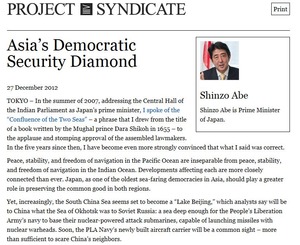1月 312013
*報道されない安倍総理の「セキュリティダイアモンド構想」について
プラハに本拠を置く国際NPO団体「プロジェクトシンジケート」のウェブサイトに、12月27日付けで安倍晋三首相の英語論文が掲載された。しかし国内メディアは、産経新聞が少し取り上げただけで、沈黙を守っている。
そもそも安倍総理が英語で論文を発表していたということ自体、知らない人が多いのではないか。
安倍首相が論文を発表したのはプラハに本拠を置く国際NPO団体「プロジェクトシンジケート」のウェブサイトである。プロジェクトシンジケートは世界各国の新聞社・通信社と提携しており、各国要人のインタビュー記事を配信するなど実績あるNPO。
その重要性は。安倍総理以外の寄稿者の顔ぶれを見ても一目瞭然だろう。ジョージ・ソロス、ジョセフ・スティグリッツ、ビル・ゲイツ、マイケル・サンデル、クリスティーヌ・ラガルド、そうそうたる顔ぶれが並ぶ。
2月に出版されるプロジェクトシンジケート叢書では、安倍総理の論文がこれら寄稿者のトップページを飾ることになるようだが、日本マスコミの沈黙はf不可思議としか言いようがない。自国の総理が英文で世界に訴えた?メッセージを、当の日本国民が知らない状態を放置するようでは、世界に対してあまりに恥ずかしいというものである。
朝日・読売・日経といった国内大手新聞はプロジェクトシンジケートと提携しているにもかかわらず何を考えているのだろうか。取り上げたくない理由でも、どこかにあるのか。
そう言った意味でも是非、読んでいただきたい論文である。
興味深いのは、前回のレポートで指摘したヘリテージ財団のシナリオ=アメリカネオコン派の戦略に沿って外交政策を進めると安倍氏が宣言している内容だが、すでに11月の時点でこの論文が発表されていることである。

Asia’s Democratic Security Diamond
TOKYO – In the summer of 2007, addressing the Central Hall of the Indian Parliament as Japan’s prime minister, I spoke of the “Confluence of the Two Seas” – a phrase that I drew from the title of a book written by the Mughal prince Dara Shikoh in 1655 – to the applause and stomping approval of the assembled lawmakers. In the five years since then, I have become even more strongly convinced that what I said was correct.
Peace, stability, and freedom of navigation in the Pacific Ocean are inseparable from peace, stability, and freedom of navigation in the Indian Ocean. Developments affecting each are more closely connected than ever. Japan, as one of the oldest sea-faring democracies in Asia, should play a greater role in preserving the common good in both regions.
Yet, increasingly, the South China Sea seems set to become a “Lake Beijing,” which analysts say will be to China what the Sea of Okhotsk was to Soviet Russia: a sea deep enough for the People’s Liberation Army’s navy to base their nuclear-powered attack submarines, capable of launching missiles with nuclear warheads. Soon, the PLA Navy’s newly built aircraft carrier will be a common sight – more than sufficient to scare China’s neighbors.
That is why Japan must not yield to the Chinese government’s daily exercises in coercion around the Senkaku Islands in the East China Sea. True, only Chinese law-enforcement vessels with light weaponry, not PLA Navy ships, have entered Japan’s contiguous and territorial waters. But this “gentler” touch should fool no one. By making these boats’ presence appear ordinary, China seeks to establish its jurisdiction in the waters surrounding the islands as a fait accompli.
If Japan were to yield, the South China Sea would become even more fortified. Freedom of navigation, vital for trading countries such as Japan and South Korea, would be seriously hindered. The naval assets of the United States, in addition to those of Japan, would find it difficult to enter the entire area, though the majority of the two China seas is international water.
Anxious that such a development could arise, I spoke in India of the need for the Indian and Japanese governments to join together to shoulder more responsibility as guardians of navigational freedom across the Pacific and Indian oceans. I must confess that I failed to anticipate that China’s naval and territorial expansion would advance at the pace that it has since 2007.
The ongoing disputes in the East China Sea and the South China Sea mean that Japan’s top foreign-policy priority must be to expand the country’s strategic horizons. Japan is a mature maritime democracy, and its choice of close partners should reflect that fact. I envisage a strategy whereby Australia, India, Japan, and the US state of Hawaii form a diamond to safeguard the maritime commons stretching from the Indian Ocean region to the western Pacific. I am prepared to invest, to the greatest possible extent, Japan’s capabilities in this security diamond.
My opponents in the Democratic Party of Japan deserve credit for continuing along the path that I laid out in 2007; that is to say, they have sought to strengthen ties with Australia and India.
Of the two countries, India – a resident power in East Asia, with the Andaman and Nicobar Islands sitting at the western end of the Strait of Malacca (through which some 40% of world trade passes) – deserves greater emphasis. Japan is now engaged in regular bilateral service-to-service military dialogues with India, and has embarked on official trilateral talks that include the US. And India’s government has shown its political savvy by forging an agreement to provide Japan with rare earth minerals – a vital component in many manufacturing processes – after China chose to use its supplies of rare earths as a diplomatic stick.
I would also invite Britain and France to stage a comeback in terms of participating in strengthening Asia’s security. The sea-faring democracies in Japan’s part of the world would be much better off with their renewed presence. The United Kingdom still finds value in the Five Power Defense Arrangements with Malaysia, Singapore, Australia, and New Zealand. I want Japan to join this group, gather annually for talks with its members, and participate with them in small-sized military drills. Meanwhile, France’s Pacific Fleet in Tahiti operates on a minimal budget but could well punch above its weight.
That said, nothing is more important for Japan than to reinvest in its alliance with the US. In a period of American strategic rebalancing toward the Asia-Pacific region, the US needs Japan as much as Japan needs the US. Immediately after Japan’s earthquake, tsunami, and nuclear disaster in 2011, the US military provided for Japan the largest peacetime humanitarian relief operation ever mounted – powerful evidence that the 60-year bond that the treaty allies have nurtured is real. Deprived of its time-honored ties with America, Japan could play only a reduced regional and global role.
I, for one, admit that Japan’s relationship with its biggest neighbor, China, is vital to the well-being of many Japanese. Yet, to improve Sino-Japanese relations, Japan must first anchor its ties on the other side of the Pacific; for, at the end of the day, Japan’s diplomacy must always be rooted in democracy, the rule of law, and respect for human rights. These universal values have guided Japan’s postwar development. I firmly believe that, in 2013 and beyond, the Asia-Pacific region’s future prosperity should rest on them as well.
Shinzo Abe is Prime Minister of Japan and President of the Liberal Democratic Party. He wrote this article in mid November, before Japan’s elections.
<日本語>
「アジアの民主主義セキュリティダイアモンド」
2007年の夏、日本の首相としてインド国会のセントラルホールで演説した際、私は「二つの海の交わり」 ─1655年にムガル帝国の皇子ダーラー・シコーが著わした本の題名から引用したフレーズ─ について話し、居並ぶ議員の賛同と拍手喝采を得た。あれから5年を経て、私は自分の発言が正しかったことをますます強く確信するようになった。
太平洋における平和、安定、航海の自由は、インド洋における平和、安定、航海の自由と切り離すことは出来ない。発展の影響は両者をかつてなく結びつけた。アジアにおける最も古い海洋民主国家たる日本は、両地域の共通利益を維持する上でより大きな役割を果たすべきである。
にもかかわらず、ますます、南シナ海は「北京の湖」となっていくかのように見える。アナリストたちが、オホーツク海がソ連の内海となったと同じく南シナ海も中国の内海となるだろうと言うように。南シナ海は、核弾頭搭載ミサイルを発射可能な中国海軍の原潜が基地とするに十分な深さがあり、間もなく中国海軍の新型空母がよく見かけられるようになるだろう。中国の隣国を恐れさせるに十分である。
これこそ中国政府が東シナ海の尖閣諸島周辺で毎日繰り返す演習に、日本が屈してはならない理由である。軽武装の法執行艦ばかりか、中国海軍の艦艇も日本の領海および接続水域に進入してきた。だが、このような“穏やかな”接触に騙されるものはいない。これらの船のプレゼンスを日常的に示すことで、中国は尖閣周辺の海に対する領有権を既成事実化しようとしているのだ。
もし日本が屈すれば、南シナ海はさらに要塞化されるであろう。日本や韓国のような貿易国家にとって必要不可欠な航行の自由は深刻な妨害を受けるであろう。両シナ海は国際海域であるにもかかわらず日米両国の海軍力がこの地域に入ることは難しくなる。
このような事態が生じることを懸念し、太平洋とインド洋をまたぐ航行の自由の守護者として、日印両政府が共により大きな責任を負う必要を、私はインドで述べたのであった。私は中国の海軍力と領域拡大が2007年と同様のペースで進むであろうと予測したが、それは間違いであったことも告白しなければならない。
東シナ海および南シナ海で継続中の紛争は、国家の戦略的地平を拡大することを以て日本外交の戦略的優先課題としなければならないことを意味する。日本は成熟した海洋民主国家であり、その親密なパートナーもこの事実を反映すべきである。私が描く戦略は、オーストラリア、インド、日本、米国ハワイによって、インド洋地域から西太平洋に広がる海洋権益を保護するダイアモンドを形成することにある。
対抗勢力の民主党は、私が2007年に敷いた方針を継続した点で評価に値する。つまり、彼らはオーストラリアやインドとの絆を強化する種を蒔いたのであった。
(世界貿易量の40%が通過する)マラッカ海峡の西端にアンダマン・ニコバル諸島を擁し、東アジアでも多くの人口を抱えるインドはより重点を置くに値する。日本はインドとの定期的な二国間軍事対話に従事しており、アメリカを含めた公式な三者協議にも着手した。製造業に必要不可欠なレアアースの供給を中国が外交的な武器として使うことを選んで以後、インド政府は日本との間にレアアース供給の合意を結ぶ上で精通した手腕を示した。
私はアジアのセキュリティを強化するため、イギリスやフランスにもまた舞台にカムバックするよう招待したい。海洋民主国家たる日本の世界における役割は、英仏の新たなプレゼンスとともにあることが賢明である。英国は今でもマレーシア、シンガポール、オーストラリア、ニュージーランドとの五カ国防衛取極めに価値を見いだしている。私は日本をこのグループに参加させ、毎年そのメンバーと会談し、小規模な軍事演習にも加わらせたい。タヒチのフランス太平洋海軍は極めて少ない予算で動いているが、いずれ重要性を大いに増してくるであろう。
とはいえ、日本にとって米国との同盟再構築以上に重要なことはない。米国のアジア太平洋地域における戦略的再編期にあっても、日本が米国を必要とするのと同じぐらいに、米国もまた日本を必要としているのである。2011年に発生した日本の地震、津波、原子力災害後、ただちに行なわれた米軍の類例を見ないほど巨大な平時の人道支援作戦は、60年かけて成長した日米同盟が本物であることの力強い証拠である。
私は、個人的には、日本と最大の隣国たる中国の関係が多くの日本国民の幸福にとって必要不可欠だと認めている。しかし、日中関係を向上させるなら、日本はまず太平洋の反対側に停泊しなければならない。というのは、要するに、日本外交は民主主義、法の支配、人権尊重に根ざしていなければならないからである。これらの普遍的な価値は戦後の日本外交を導いてきた。2013年も、その後も、アジア太平洋地域における将来の繁栄もまた、それらの価値の上にあるべきだと私は確信している。


 Follow me on Twitter
Follow me on Twitter
Sorry, the comment form is closed at this time.